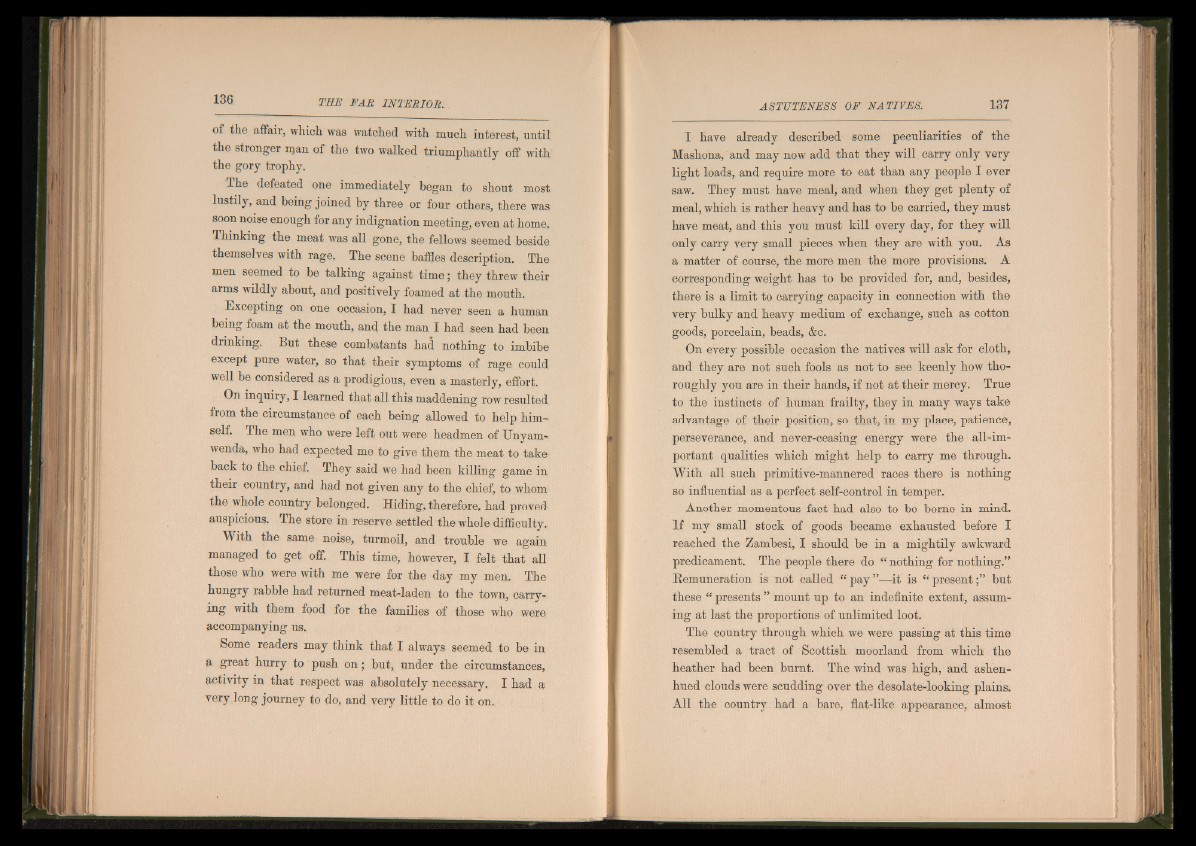
of the affair, which was watched with much interest, until
the stronger njan of the two walked triumphantly off with
the gory trophy.
The defeated one immediately began to shout most
lustily, and being joined by three or four others, there was
soon noise enough for any indignation meeting, even at home.
Thinking the meat was all gone, the fellows seemed beside
themselves with rage. The scene baffles description. The
men seemed to be talking against time; they threw their
arms wildly about, and positively foamed at the mouth.
Excepting on one occasion, I had never seen a human
being foam at the mouth, and the man I had seen had been
drinking. But these combatants had nothing to imbibe
except pure water, so that their symptoms of rage could
well be considered as a prodigious, even a masterly, effort.
On inquiry, I learned that all this maddening row resulted
from the circumstance of each being allowed to help him-
self. The men who were left out were headmen of Unyam-'
wenda, who had expected me to give them the meat to take
back to the chief. They said we had been killing game in
their country, and had not given any to the chief, to whom
the whole country belonged. Hiding, therefore, had proved
auspicious. The store in reserve settled the whole difficulty.
With the same noise, turmoil, and trouble we again
managed to get off. This time, however, I felt that all
those who were with me were for the day my men. The
hungry rabble had returned meat-laden to the town, carrying
with them food for the families of those who were
accompanying us.
Some readers may think that I always seemed to be in
a great hurry to push o n ; but, under the circumstances,
activity in that respect was absolutely necessary. I had a
very long journey to do, and very little to do it on.
I have already described some peculiarities of the
Mashona, and may now add that they will carry only very
light loads, and require more to eat than any people I ever
saw. They must have meal, and when they get plenty of
meal, which is rather heavy and has to be carried, they must
have meat, and this you must kill every day, for they will
only carry very small pieces when they are with you. As
a matter of course, the more men the more provisions. A
corresponding weight has to be provided for, and, besides,
there is a limit to carrying capacity in connection with the
very bulky and heavy medium of exchange, such as cotton
goods, porcelain, beads, &c.
On every possible occasion the natives will ask for cloth,
and they are not such fools as not to see keenly how thoroughly
you are in their hands, if not at their mercy. True
to the instincts of human frailty, they in many ways take
advantage of their position, so that, in my place, patience,
perseverance, and never-ceasing energy were the all-important
qualities which might help to carry me through.
With all such primitive-mannered races there is nothing
so influential as a perfect self-control in temper.
Another momentous fact had also to be borne in mind.
If my small stock of goods became exhausted before I
reached the Zambesi, I should be in a mightily awkward
predicament. The people there do “ nothing for nothing.”
Remuneration is not called “ pay ”—it is “ p r e s e n t b u t
these “ presents ” mount up to an indefinite extent, assuming
at last the proportions of unlimited loot.
The country through which we were passing at this time
resembled a tract of Scottish moorland from which the
heather had been burnt. The wind was high, and ashen-
hued clouds were scudding over the desolate-looking plains.
All the country had a bare, flat-like appearance, almost